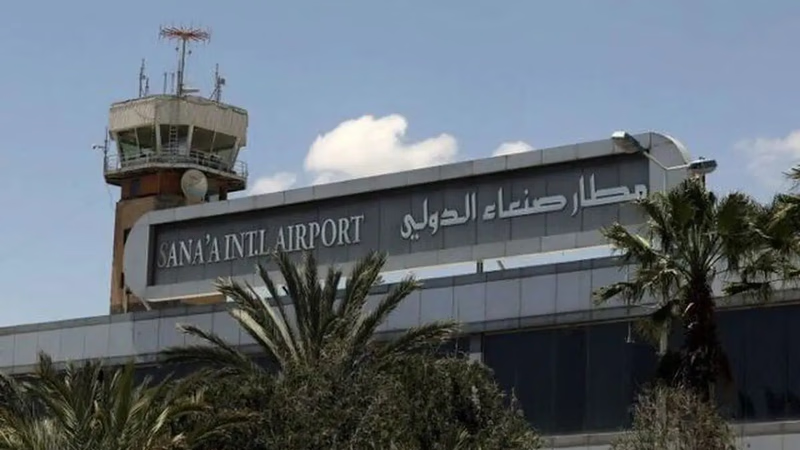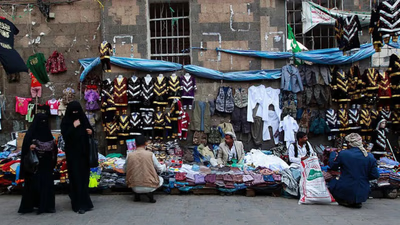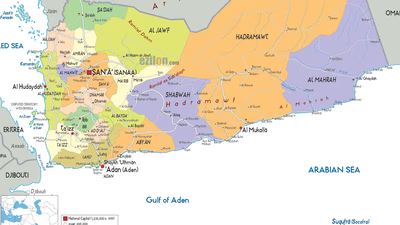
Yemen"s ports play a crucial role in commodity trade. "
Yemen's main exports traditionally include crude oil, liquefied natural gas (LNG), refined petroleum products, fish, and agricultural products such as coffee, honey, and fruits. The primary export ports in Yemen are Aden, Hodeidah, and Mukalla. These ports play a crucial role in facilitating the export of goods and commodities. The conflict in Yemen has severely impacted the export sector. Infrastructure damage, including to ports and transportation networks, has hindered the country's ability to export goods effectively. Additionally, restrictions, blockades, and security concerns have further disrupted trade activities.
Yemen has significant reserves of oil and natural gas. Prior to the conflict, petroleum exports, including crude oil and liquefied natural gas (LNG), were one of Yemen's main sources of revenue. However, the conflict has severely disrupted oil production and export capabilities. Yemen has a long history of agricultural production, particularly in the cultivation of crops like coffee, qat (a stimulant plant), honey, fruits, and vegetables. These products have been traditionally exported to regional and international markets. Yemen's coastal location makes fishing an important economic activity. Fish, including tuna, sardines, and shrimp, have been exported to neighboring countries and international markets. However, the conflict has impacted the fishing industry due to restricted access to the sea and damage to fishing infrastructure.
Estimates show that the revenue situation in Yemen in 2019 grew by about 12 percent. What is very important in the Yemeni economy is the situation of the annual GDP growth rate, which has grown by 20.00%. Trade balances in Yemen are about 14% higher than before, and growth in this area is considered acceptable. The current account balance in Yemen is about 13 percent, while the current account balance to GDP has grown by more than 13 percent. The export and import system in Yemen has grown by 74%, and it is clear that the trade process in Yemen is being seriously pursued. Keep in mind that the situation of capital turnover in Yemen has also increased by 17%. Yemen's ranking of the government line has been seriously pursued, internet speed in this country has grown by 12%. Yemen's ease of doing business has grown by 18%.
The country has reached more than 14% in its competitive index. The corruption index in this country is around 27 points. The rate of corruption in the country has also increased by 17%. The economic and trade situation in Yemen is more than 29% based on competitive indicators. The corporate tax rate in Yemen is around 35.00%, while the status of the tax rate in Yemen is determined by the government, and estimates show that, in general, historical data in recent years are better than before.
Yemen relies heavily on imports to meet its food requirements. Basic commodities such as wheat, rice, sugar, cooking oil, and dairy products are imported to fulfill domestic needs. The conflict has resulted in food insecurity and a humanitarian crisis, making the import of essential food items crucial for the population. Yemen lacks sufficient domestic energy production capacity. As a result, it heavily depends on imports of fuel and energy products like gasoline, diesel, and liquefied petroleum gas (LPG) to meet the energy needs of its population and industries. Yemen imports various consumer goods, including textiles, electronics, vehicles, and machinery, to fulfill domestic demand and support economic activities. These imports have been affected by the conflict-related challenges, including disrupted supply chains and limited access to foreign markets.
Yemen has been heavily reliant on international humanitarian aid to address the urgent needs of its population, including food, medical supplies, and other essential commodities. International organizations and relief agencies play a vital role in coordinating and delivering humanitarian assistance. The Yemeni economic chart and calendar show that the personal income tax rate in Yemen was initially 15 percent, which is now seen at 20 percent. As it is known, in Yemen, the sales tax rate is around 2 to 5 percent. Company registration in Yemen is mostly seen in the food route. The price of the Yemeni dinar has not changed much, and in changing the exchange rate of the Yemeni dinar, the current economic climate is assessed.
Yemen relies heavily on imports to meet its domestic needs. Key imported goods include food items, fuel, machinery, vehicles, pharmaceuticals, and various consumer goods.The major ports involved in Yemen's import activities are Aden, Hodeidah, and Mukalla. These ports are crucial entry points for goods coming into the country. Importing goods into Yemen has been significantly affected by the conflict and the resulting humanitarian crisis. The conflict has led to increased restrictions, delays, and disruptions in supply chains, making it difficult to bring essential goods into the country. Importers must navigate security concerns, bureaucratic hurdles, and logistical challenges.
-

Yemen"s economy has faced severe challenges due to ongoing conflict, leading to a significant contraction in GDP and high inflation rates. The disruption of supply chains and reduced domestic production have increased reliance on imports, resulting in widespread job losses and high unemployment. The humanitarian crisis has escalated, with millions requiring assistance for basic needs such as food and healthcare. Despite these challenges, Yemen"s trade system has shown growth, with a 74% increase in export and import activities. The current account balance is approximately 13%, indicating some resilience in trade processes. However, the depreciation of the Yemeni rial has created exchange rate volatility, complicating business operations. Foreign direct investment is projected to grow by 15%, while crude oil production remains significant at over 11%. Yemen"s ease of doing business has improved by 18%, reflecting potential opportunities for trade despite the political instability that deters international investment.
The conflict has also disrupted trade routes and hindered commercial activities, but humanitarian aid imports remain vital. Overall, while Yemen faces substantial economic hurdles, there are signs of growth in certain sectors that could be leveraged for future development. "
-

Saudi Arabia and the UAE have been pivotal in supporting Yemen"s internationally recognized government through military and humanitarian aid. The U. S. has also played a role by providing military support and facilitating peace negotiations. Various international organizations, including the World Bank and IMF, are engaged in addressing Yemen"s humanitarian crisis. The demographic profile of Yemen shows a young population with a literacy rate of about 50%. Recent improvements in economic conditions are evident, particularly in the organic food sector and machine equipment production. Urbanization efforts are underway, with significant growth in construction and transportation sectors.
The Yemeni government is increasingly visible in its investment strategies, aiming to enhance economic stability. Additionally, the UN and EU have been active in promoting peace and development initiatives, while other Gulf Cooperation Council (GCC) countries contribute through aid programs. The evolving dynamics of international support reflect the complexities of the ongoing conflict and humanitarian needs.
-

Yemen"s legal framework is shaped by its 2001 constitution, which establishes the government"s structure and individual rights. Islamic law, or Sharia, significantly influences personal, family, and criminal law. The civil law system, based on French law, includes the Yemeni Commercial Code that governs commercial activities such as contracts and business transactions. Property rights are regulated by laws concerning real estate ownership and transfers. Intellectual property laws protect creators" rights. The ongoing conflict has severely impacted Yemen"s economy, leading to increased poverty and a decline in agricultural production. Coffee, particularly Moka coffee, was once a significant export but has diminished due to war conditions. The agricultural sector now primarily focuses on qat cultivation for domestic use.
Oil and gas production has also suffered due to security issues stemming from the conflict. Family matters are largely governed by Sharia principles, while labor rights are outlined in the Yemeni Labor Law. Restoring political stability is crucial for reviving Yemen"s economy and alleviating poverty. "
-

Yemen"s major cities, including Aden, Taiz, Al Hudaydah, Mukalla, Ibb, Dhamar, and Sayyan, play crucial roles in the country"s trade and commerce landscape. Aden serves as a strategic port city along the Gulf of Aden, facilitating significant import and export activities. Al Hudaydah is another vital port on the Red Sea coast that acts as a gateway for trade despite ongoing conflicts. Taiz is recognized for its historical significance and has developed into an academic hub. Mukalla stands out as a commercial center in southeastern Yemen, while Ibb is known for its agricultural contributions. Dhamar boasts historical sites and is advancing economically. Sayyan combines scenic beauty with agricultural activities and tourism potential. The historical context of Yemen reveals a rich trading legacy dating back to ancient civilizations like the Sabaeans and Qutban.
The region"s strategic location has historically linked trade routes from the Persian Gulf to the Mediterranean Sea, making it an essential player in regional commerce. "
-

Yemen"s export and import system is significantly influenced by ongoing conflict, which has severely disrupted trade activities. The country traditionally exports crude oil, LNG, refined petroleum products, fish, and agricultural goods like coffee and honey. Key ports such as Aden, Hodeidah, and Mukalla are vital for these exports but have suffered from infrastructure damage due to the conflict. Despite these challenges, Yemen"s export and import system has shown growth of 74%, indicating a persistent effort to engage in trade. The economy relies heavily on imports for essential commodities like food and fuel due to insufficient domestic production capacity. The humanitarian crisis exacerbated by the conflict has made importing basic necessities crucial for survival. Additionally, Yemen"s ease of doing business has improved by 18%, suggesting potential opportunities for B2B marketplaces in the region. However, challenges remain with supply chain disruptions and security concerns affecting both importers and exporters. The reliance on international aid highlights the urgent need for effective supply chain solutions in Yemen"s trade landscape.
-

Yemen, located at the southern entrance of the Red Sea, serves as a vital trade hub due to its strategic position. The country has several key ports, including Aden and Hodeidah, facilitating significant import and export activities. Recent years have seen a shift in Yemen"s import landscape, with live food and livestock becoming predominant. Despite ongoing conflicts, Yemen"s economy has shown resilience, with a reported 12% growth in revenue generation and a notable 20% increase in GDP growth rate. Trade balances have improved by 14%, while the export-import system has expanded by 74%. The capital turnover situation has also increased by 17%, indicating a positive trend in economic activity. Improvements in infrastructure and ease of doing business have been observed, with internet speed rising by 12%. However, Yemen continues to face economic challenges due to political instability. The diverse climate across the country affects agricultural productivity and trade dynamics.






